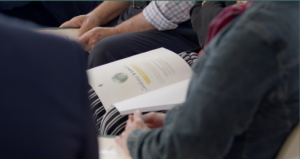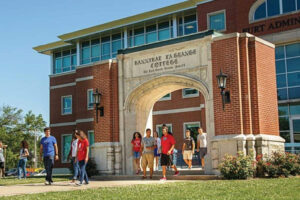
WAKE FOREST, N.C. (BP)–Whether walking across the bricked sidewalks crisscrossing Southeastern Baptist Theological Seminary’s manicured lawns or sitting behind a computer terminal at the school’s library tracking the whereabouts of books on loan, Dean Darroch feels right at home.
“The school has been my salvation the last few years,” said Dean. “I’ve been affirmed by these people so much I just can’t explain it. … In the very beginning when I applied to come to school over here, it was hard for me to believe that they would accept me to start with. You know, I was an inmate, a woman, and who would care?”
Dean’s unlikely pilgrimage to Southeastern began almost 18 years ago, following her conviction of conspiracy to commit first-degree murder, in plotting to kill her estranged husband by instructing her nephew to murder Raeford Darroch, enabling her to collect on his life insurance policy.
Lucille Johnson, Raeford Darroch’s sister, discovered her brother’s decapitated body Nov. 7, 1979, on a couch inside his mobile home. The victim, investigators said, died from a shotgun blast to the head.
Ten months later, Dean, her nephew, Donnie Wells, and her sister, Rena Crowder, were arrested in Danville, Va. Dean later was sentenced to serve a term of at least one year to life in prison. Wells and Crowder struck a deal with the state to testify against Dean and plead guilty to second-degree murder in order to avoid the death penalty. Wells was sentenced to 60 years in prison. Crowder received a 40-year prison sentence. Wells, who previously had spent time in prison for armed robbery, was released from prison in 1989. Crowder was paroled in 1991.
Dean, a mother of three and grandmother of seven who has maintained her innocence, has been denied early release by the North Carolina Parole Commission for 17 consecutive years, with the most recent denial in January.
And her future chances of being paroled were not helped by a recent ruling prohibiting friends and family from appearing before the state parole commission on behalf of convicted criminals.
Dean said she has long since stopped counting down the days between yearly parole hearings. “God has taught me the patience of Job,” she said. “I used to not have any patience at all and now God gives me a peace about (being denied parole). It bothers other people more than it does me. … ‘For God so loved the world that he gave his only begotten Son’ gives me more strength than anything else.”
Instead of dwelling on the apparent unfairness of remaining an inmate while the two people who actually committed the crime are free, Dean chooses to use her time ministering to fellow inmates through a weekly Bible study she leads at the prison.
“I’ve had a lot of them come to me crying, saying they really appreciate what I do, and that it is very meaningful to them. I’m there just to plant the seed.”
While incarcerated, Dean also has earned her high school diploma, as well as an associate degree and bachelor’s degree and presently is working on a master of divinity degree in Christian counseling at Southeastern. She is scheduled to graduate from Southeastern in December.
“When I learned that I did come up for parole every year, I was encouraged to do well and try to do what I needed to do in the system so I could get out on early parole,” she said. “The superintendent at the time told me that she didn’t foresee me pulling more than eight years. Nobody else had pulled anymore than that off a sentence similar to mine with the same charges.”
The thought of getting an education, Dean said, had never crossed her mind upon arriving at Women’ Prison in Raleigh, N.C.
“I really didn’t foresee me trying to get an academic degree because from the time that I can remember, my mother had always told me how stupid I was and that I was too dumb to do anything right, and I had that mentality,” she said. “Then when I got married, my husband told me the same thing.”
Courses in psychology and counseling taken at Southeastern have helped Dean deal with her plight in life.
“The papers and stuff I had to write, they were about the best things that have happened to me,” she said. “Writing about some of the painful things that happened to me and getting in touch with that has helped me to heal some.”
Married at 18, Dean said she was constantly haunted by her husband’s perpetual bouts with alcoholism. She still remembers the night he held a gun to her head for hours threatening to kill her. Despite his destructive behavior, Dean said, she never seriously contemplated killing her husband.
It was a flip-of-the-tongue comment, Dean said, she made in frustration about her husband’s drunkenness that her nephew took as a license to kill Raeford Darroch.
“I was so mad, and I said, ‘He makes me so mad I could kill him,’ and Donnie said, ‘Well, I’ll do it.’ I laughed and said, ‘I know you can’t kill anybody,’ and that’s all I thought about.”
Dean said she frequently took her three children and left their house when her husband was drunk and out of control. At the time of the murder, Dean was living in Danville, Va., near her family.
Due to her excellent behavior over the years, Dean has increasingly been given more freedom as an inmate. About eight years ago, she was transferred from the confines of barbed wire and armed guards at Women’s Prison to the less restrictive Raleigh Correctional Center for Women. In 1992, she began attending Southeastern.
“The people here have just opened their arms to me,” she said, wiping the tears from her cheeks. “Sometimes I just can’t believe that people can love me. I always thought I was unlovable.”
Dean said that although she accepted Christ as her Savior when she was 12, she met God afresh and anew while in prison. She said she was reminded of the love of Jesus by a prison chaplain from Jamaica. “She taught me about God’s love. She turned me around.”
Upon coming to Southeastern, Dean said, God’s love was revealed to her beyond her imagination. “He opened all the doors, and that was when I first started realizing that there is a loving God. There is a God that loves me. God just put people there for me. Every time that I needed something, every time that a concern came up — a ride, money for school, bus tickets — somebody was always there for me and God just put them in my path and I didn’t have to ask. I didn’t have to bargain with people like I had always done all my life. I used to use my body to get what I needed and a lot of times I would look at people and say, ‘Well, what do you want from me?’ I found out that they didn’t want anything from me, that they did it because of God’s love for me.”
Commuting to Southeastern for Dean is no small chore either. Her day begins at 5 a.m. She takes a Raleigh city bus at 6 a.m. for an hour-long ride to the end of the bus line about 10 miles south of Wake Forest. She then catches a ride to the seminary with another commuter, arriving at Southeastern by 8 a.m., ready to begin her job at the library.
“It’s amazing, I don’t see how, under the circumstances, she can be as cheerful as she is,” said Judy Durham, Dean’s supervisor at the library and friend. “Most of the time she’s upbeat and an inspiration to everybody who knows her.”
Sybil Needham is a student at Southeastern and Dean’s friend. Needham circulated a petition during the Christmas break garnering about 140 signatures from people supporting Dean’s parole.
“For Dean to have done with her life what she has done … says a lot about her character, her stamina, her integrity,” Needham said.
Dean said she wasn’t surprised to be turned down again in January by the parole board. “After 17 times, I would have been more surprised if they would have said yes. I mean I would have been elated, but I would have really been dumbfounded.”
Dean said she longs for freedom more for her family’s sake than her own. Weekend visits twice a month with her two daughters reminds her of the consequences her family must endure.
As for the family of her deceased husband, Dean said she hopes one day they will forgive her. She has written her 87-year-old mother-in-law expressing her regrets.
“They’re being eaten up by this,” Dean said. “I know that they hurt. I’ve tried to think what I would feel like if somebody had been anyway responsible for my son being dead. I don’t know how benevolent I would be toward them. … I understand her hating me, and I’m sorry, because I love her.”
When and if Dean is ever paroled, she said she would like to return to Women’s Prison next time as a chaplain. She said that working for about eight years with prison chaplains as well as chaplains at Dorthea Dix Hospital, the Raleigh Rescue Mission and Shaw University have given her a burden for women inmates.
As for the present, however, Dean said she remains free even inside prison walls.
“I think God wants me here,” Dean said contentedly while taking a break from her seminary job in the library. “If he didn’t want me here, he would have closed the doors instead of opening them. And he’s opened every door for me. He’s got some plan for me. And I’m waiting. Whatever it is, I’m ready for it.”















